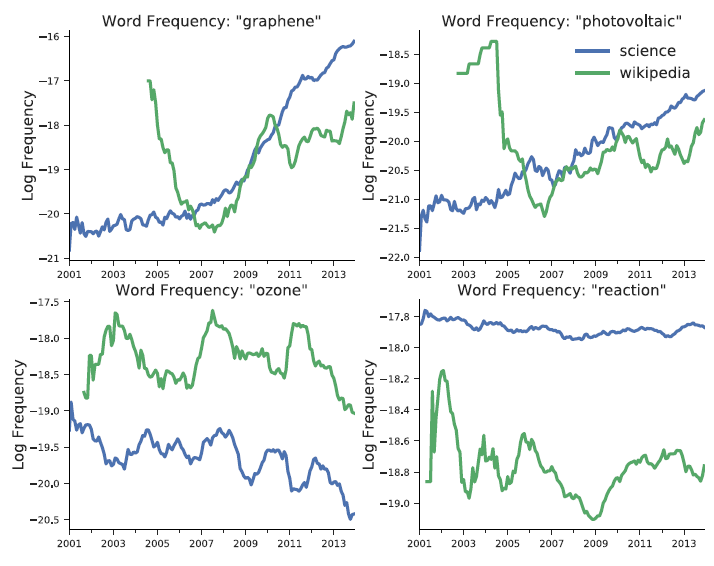The study found that Wikipedia affects science
 Humanity has limited access to the most complete sources of scientific knowledge - scientific journals. In many ways, such a sad picture emerged due to the commercial policies of publishers and paid subscriptions, as well as the assumption that the fact of publication in a “paid” magazine is proof of the scientific significance of the discovery.
Humanity has limited access to the most complete sources of scientific knowledge - scientific journals. In many ways, such a sad picture emerged due to the commercial policies of publishers and paid subscriptions, as well as the assumption that the fact of publication in a “paid” magazine is proof of the scientific significance of the discovery.
Unlike publishers, most people understand that free scientific knowledge is a blessing for all (and this benefit is more than “filtering” quality articles in authoritative publications, see the Arrow information paradox ). There are a number of research projects that are funded mainly from government subsidies, while being open for free. These are, for example, banks of physical objects, such as seed banks and repositories of model organisms — a number of studies show that the creation of such open banks contributed to scientific activity in this direction. There are also free open-to-everyone informational repositories, such as the Human Genome project or StackOverflow.com (source of knowledge in computer programming).
Wikipedia is the world's largest source of scientific information for the general public. This is generally the 5th most popular site on the Internet. Now a couple of scientists from the Massachusetts Institute of Technology and the University of Pittsburgh have published a scientific article in favor of the fact that Wikipedia promotes the dissemination of scientific knowledge, it is read and used by scientists, links to it in their scientific works, and Wikipedia largely forms the direction of scientific research in principle.
In their article, the authors quote Charles Darwin from his letter to his fellow biologist Thomas Henry Huxley in 1865: "I sometimes think that common and popular tracts are almost as important for the progress of science as the original work." After all, his “Origin of Species” was both an outstanding scientific work and a bestseller.
The number of scientific articles in the English-language Wikipedia, depending on the definition and methods of calculation, from 500 thousand to 1 million. The authors say that in the field of chemistry, which was checked for the experiment, 93% of scientific articles explain the topic at the level of initial courses of specialized universities, 47% of articles explain the topic at the senior level.

At this level, it is completely obvious that Wikipedia objectively reflects science. But the question is, how does it affect science, how much do scientists read Wikipedia, and can Wikipedia influence the activity of scientific research?
In this case, the topic was studied using two approaches. First, the calculation of the occurrence of scientific terms on the pages of Wikipedia and on the pages of scientific journals. The authors have processed the full history of edits of all articles (20 terabytes of data) and all the full versions of articles of two thousand Elsevier scientific journals since 1995 (0.6 terabytes).
Of course, these vocabulary bases largely overlap. Thus, 61% of words from scientific literature are found in Wikipedia, and 63% of words from the latter are found in scientific literature. However, the relative frequency of words in some cases is noticeably different.
| Word | Place in the scientific literature | Wikipedia location |
|---|---|---|
| Acid | 59 | 65 |
| Reaction | 32 | 132 |
| Graphene | 2143 | 3099 |
| Photovoltaic | 5764 | 7651 |
| Gravity | 6139 | 2375 |
| Pokemon | 745 676 | 14,485 |
In their measurements, scientists, of course, made an amendment to the language drift, that is, the change in the frequency of terms with time.

The change in frequency in time of some terms in chemistry
The second approach is experimental. Experts on certain topics were asked to write a series of articles for Wikipedia. Then the random half of these articles was actually published on the site, and the second half was kept as a control sample. Subsequently, scientists studied how the frequency of words from published articles and from articles of the control group increased in the scientific literature. The results of the experiment confirmed the conjecture: there were more words from Wikipedia articles in the literature. This proves that Wikipedia does have an impact on current research.

The introduction of certain information in Wikipedia affects future research. This means not only the great importance of Wikipedia itself, but also the great importance of open scientific knowledge in principle. An article behind a paid firewall is much less likely to have an impact on the scientific community and on society as a whole than an article in the public domain. It turns out that the open publication of articles is a very cost-effective way to develop science. This benefit is much more than the benefit from “filtering” articles in paid journals.
The authors of the scientific work are confident that it is now inappropriate to say that Wikipedia is simply a source of well-known knowledge.
All Articles